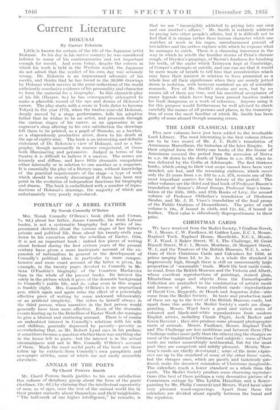Mrs. Norah Connolly O'Brien's book (Rich and Cowan, 7s. 6d.)
about her father, James Connolly, the Irish Labour leader, is not a systematic biography but a series of
pressionist sketches about the various stages of her father's private and political life, from about his twenty-sixth year down to his execution after • the rebellion of Easter, 1016., It is not an important book : indeed few pieces of writing about Ireland during the first sixteen years of the present century have given a more inadequate account of the ex- pansion of nationalism in general or the development of Connolly's political ideas in particular (a more compre- hensive and more exact account of the latter is given, fOr example, in the twenty pages devoted to Connolly in Mr. Sean O'Faoliiin's biography of the Countess Markieviez than in the whole of the 'present book). Its interest lies solely in the picture which it gives of the domestic background to Connolly's public life, and its value even in this respect is frankly slight. Mrs. Connolly O'Brien's is an unpractised pen, which again and again ruins the 'effect of a potentially effective piece of writing by some awkward whimsicality or an artificial simplicity. She refers to herself always in the third person, when narrative in the first person would generally have been more effective. .kven of the dramatic. events leading up to the Rebellion of Easter Week she manages to give a blurred and stuttering account. There is of .course an undoubted interest in COnnolly's relations with his wife and children, generally depressed by poverty—poverty ,ao overwhelming that, as Mr. Robert Lynd says in his preface' it sometinacsbekaine a question whether there was anything else in the hOuse left to paWn—but the interest is in the actual circumstances and not in Mrs. Connolly O'Brien's account of theth. -Much the most useful parts of the book are those taken. up by extracts''.from Connolly's own pamphlets and newspaper articles, sonic of which arc not easily accessible
elseWhere. . . .










































 Previous page
Previous page